Email interview with Ingo Bischof - august 2002
Photos partly borrowed from www.Kraan.de,
partly by Skiold & Andi Gorres
|
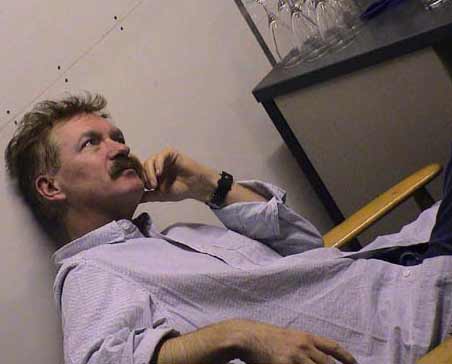 Michael Bohn: When
did you start to play music ?
Michael Bohn: When
did you start to play music ?
Ingo Bischof: At the age of 8.
Michael: What instrument ?
Ingo: Piano
Michael:
What kind of music made you interested in playing yourself ?
Ingo: Classical music
Michael: How did you become
a musician ?
Ingo: I felt I had some
talent, and so it became my desire.
Michael: Which are your
most important musical influences ?
Ingo: Chopin, Mozart, Beethoven,
Stones, Spencer Davis Group, Coltrane, Miles Davis, Weather Report,
Zawinul, Mahavishnu Orchestra and funk at any rate.
Michael:
What are your most important personal influences ?
Ingo: My parents, Karthago, Kraan, Guru
Guru,...rock, jazz, indish and classical music.
Michael: Who do you listen
to for the time being?
Ingo: Classical music and jazz
Michael: What older stuff
will you never get tired of ?
Ingo: The same
Michael:
Are there music types /genres you dislike ? Why ?
Ingo: German folk music / modern
classic, (mostly)
Michael:
How about composers like Bartok, Debussy, Ravel, Stravinsky, Hindemith,
Martinu ?
Ingo: Oops, I think that's a misapprehension,
I like them all but Martinu whom I don't know. I related more on the contemporary
ones like Henze etc. I don't understand what they're doing, and even more,
I don't feel it.
Michael: Claude Debussy
claimed that music expressed or contained feelings, Igor Stravinsky meant
the opposite: it's just notes.
What is your opinion about this discussion? Can this be viewed out
of a cultural context - western/eastern?
Ingo: I would agree with Debussy,
and I nearly can't imagine, that Mr. Stravinsky denies feelings
and imaginations of music. Obviously all are notes, but of course
they want to be filled with contents, and that's not a technical
process.
From the cultural standpoint of course Europe was and is much more
"head orientated" than Africa, Asia and to some degree
America, so you absolutely can view all that in a cultural context
too.
Michael: Has the english rockscene ever
meant anything to your musical career - I think of bands like Yes,
Genesis, Gentle Giant, King Crimson, Soft Machine, Hatfield and
the North, etc.?
Ingo: In the early days especially the
band Remo Four and Stevie Winwood, but also Soft Machine, who I
think arouse my love for the odd meters, cause they did them in
a very rockmusic-like and dirty way.
Yes was more responsible for the metaphysical / majestic division
whereby no one ever could reach them. King Crimson was slightly
too dark for me, Genesis almost too pop'ish and the others didn't
quite draw my attention. Stones, Cream and above all Hendrix, I
also would like to mention as
important influences.
Michael: Is
jazz dead ?
Ingo: No, but not really popular
at the moment.
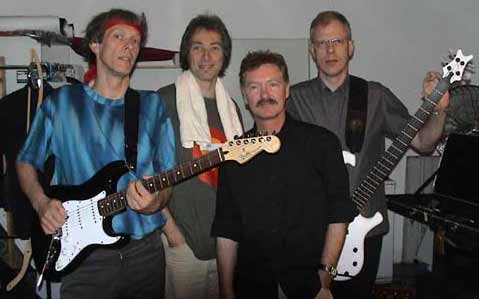
Kraan:
Michael: What relevance
does Kraan have to you, and how do you see your relevance to Kraan ?
Ingo: Well, I'm the 4th man, and I think
a quite good one. Besides I act as a chain link.
Michael: What's the special
thing about Kraan, which made and still makes you wanting
to be a part of it ?
Ingo: It turned me on - and that's what
it still does.
Michael: What was the
difference musically between playing in Karthago and Kraan ?
Ingo: Karthago was more orientated in
anglo-american styles, Kraan in contrast had already developed one of their
own.
Michael: What
is a typical Kraan song - what should be there to make it sound right (Most
fans agreed that Kraan X did'nt sound Kraanish enough) ?
Ingo: A melody, a bass which formes
the whole thing harmonicly and interesting, never heard chords, sexy rhythm
and lots of magic.
Michael: How is
the typical procedure when Kraan makes a new song ?
Ingo: Various, sometimes someone
has a nearly complete song, sometimes different parts from the members
are put together and become something typical this way .
Michael: As the
only member of Kraan that has a formal musical training, how do
you communicate your ideas to the rest of the group ?
Ingo: By simply playing it to them, if
I have something special in mind. In case they like it, everyone
finds out himself what matches to it.
Michael: Do you write guitarparts for
Peter or do you show some chord progressions and let him decide
what to do with them ?
Ingo: Since Peter has his very own special
approach to music (until today I don't know how it works for him),
and this is also expressed in his style, mostly it works the way,
he himself developes something which very good corresponds then.
Michael: What
is the difference in workingmethod from the times around 'Let it
out / Wiederhören' and now - was it more jambased then ?
Ingo: Basically I think nothing has
changed, besides the fact that we were younger and a little more
impetuous.
Michael: How do you see Hellmuts bassplaying
compared to other basplayers you have worked with ?
Ingo: Most bassplayers are more
inconspicuous, do more act in the background, for the audience as
well as musically. Hellmut manages to pull the bass out of the dark
and to make it more experiencing for the audience. A great achievement,
I think.
Michael: I think
your sound is an important part of the Kraan sound - Widerhören,
Tournee, Flyday and
Nachtfart has your fingerprints.
Ingo: Thanks
Michael: You are
not credited for many compositions, why ?
Ingo: Formerly we were credited
all together, later the real authors.
Michael: What would
be your 3 favorite Kraan tunes ?
Ingo: Let it out, Yaqui Yagua and Flyday
Michael: Kraan
have started to record a new album, will you compose any songs ?
Ingo: Some parts anyway.
Michael: You live in
Berlin, the others in southern Germany - is it a problem ?
Ingo: No, that's no problem.
Michael: Is Berlin
different musically than the rest of Germany ?
Ingo: Sometimes things
appear earlier here, but all in all it's similar.
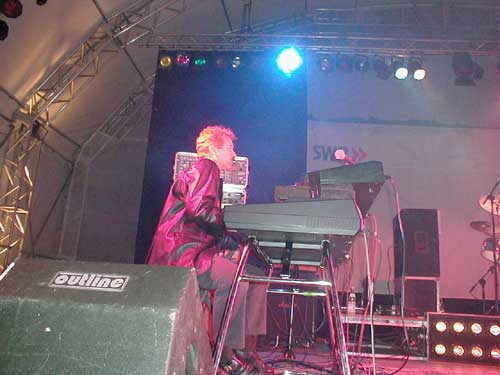
Kraan Live in Ulm 2000
Playing keyboards
Michael: You have
played so many styles, from Gitte Henning (danish sing-a-long
singerin, German pop scene) to Karthago (rock) and Tavil (sort of
Techno with jazz &
Indian flavour).
Is it difficult to do so many different things, can you avoid loosing
your own style/personality in this ?
Ingo: In first case it's a challenge
you have to meet, and if you do that not too long, or from time to time
only, then there's no danger to loose yourself. (But I know people who
did, unfortunately)
Michael: Who have been your major influences
in playing keyboards ?
Ingo: Jimmy Smith, Steve Winwood, Jan
Hammer, George Duke, Zawinul, McCoy Tyner, etc.
Michael: What qualities do you admire with
a keyboardplayer (technically - musically)?
Ingo: Rhytmic precision, harmonic overview,
tasty sounds, hot soli
Michael: When listening to Kraan Tournee,
I believe I can hear both Jan Hammer and
Herbie Hancock... But you have a soft melodic tone of your own,
easily recognizable, how did you develop this ?
Ingo: Well, to make music you need
a sound which turns you on and stimulates you, and therefore I've always
tuned my sound in a way I rather like and that's what I'm still doing today.
Michael: Do you
have any favorite chords ?
Ingo: Yes of course, the stranger
the better, I like chords you can't decode that easy, but a normal minor7
can be wonderful too.
Michael: Playing odd meters often makes a
tune more dynamic, as typically seen in balkanmusic. Kraan often made tunes
where 6/4 - 6/8 is used in a sort of polyrythmical way (with 4/4).
Do you have any favorite meters to play in ?
Ingo: I nearly like all strange meters,
5, 7, 11, 13, 15 ...
Unfortunately you can play it only very seldom, cause everyone thinks people
wouldn't like it, or couldn't move and dance, which even might be slightly
true in Germany.
In addition not every musician can play it. You have to make sure, that
it sounds flowing and not so bumpy. Together with Butze (Fischer) I've
played many strange meters.
And for example the middlepart from Vollgas Ahoi is 15/8
Michael: How would you like your keyboardplaying
develop in the future ?
Ingo: Still improving my personal sound
and making it even more recognizable, besides searching for "new"
chordstructures, and improving the soli.
Michael: In rock music
the keyboardplayer is often just making a a 'gravy of chords' behind the
vocals and guitars, to fill out the 'space' between the rythmsection and
the melody, to make up the harmonic progressions (because the keyboardplayer
is the only person who can)...
Its that a role you can recognize - how do you feel about it ?
Ingo: That depends on the stylistics,
playing a popsong you have to be aware of particular things, you have to
play song -useful -helpful. Voice and song are in the foreground.
But you have the possibility to cover much with all your different sounds.
Even though that's fun, at long term for ME it's not the right thing. I
need more freedom, need to play 'myself'.
Michael: Is it different in jazz-fusion?
Ingo: All in all yes, but even here are differences.
Michael: You
are making a soloalbum - what kind of music will it be ?
who will be playing on it ?
Ingo: Because I'm still at the
planning and developing stage, I can hardly answer. Hellmut and
Peter will play some stuff, and there also will be some voices hopefully,
and I'd like to have a woodwind instrument too.
Michael: How come
you haven't made one before ?
Ingo: I simply didn't feel the
desire untill now.
Michael: How do
you compose - is there a method ?
Ingo: No, it's various. When
I have new sounds in most cases I have some spontaneous ideas, or
there's a drum loop running and so on, sometimes when I'm sitting
at the piano. It depends.
Michael: Does
it happen that you can't find a conclusion while working on a tune
?
- In case, how do you handle it ?
Ingo: I Put the tune aside and
then listen again after a while, with distance. Then I usually can
make some steps forward. If not, forget about it.
Michael: Who would
you like to play with - if your dreams came true ?
Ingo: Allan Holdsworth would'nt
be bad.
Michael: He is
also one of my favorites. What does he mean to you, what do you
like about his music/guitar style ?
Ingo: I like his melodic feel and his
phrasing.
His sound is always special and somehow hot. But the most important
thing about him is his musical ability and taste. This guy plays
soli, which are unimaginable, very difficult and complex, though
tasty and emotional.
Michael: Who are
the other great German keyboardplayers
?
Ingo: Related to jazz there are some:
Brüninghaus, and Christoph Spendel, Wolfgang Dauner was quite
good too, he did a lot of experimenting at that time, quite avant
garde, but returned later to Jazz.
Joachim Kühn also is a nice guy (we frequently did sessions
at the Quasimodo in Berlin, Hellmut had some gigs with him too).
He had a very fundamental classic education and played quite wild
then (80ties), somehow like Maccoy Tyner, but also standards, very
good.
Related to rock there's no one coming in to my mind at the moment,
but there are some very good young people, who's names I just haven't
got in mind (not meant arrogantly).
Tavil
Michael: How did
the Tavil project come up ?
Ingo: In the 70ties I played together
with Butze in a band called Guru Guru and we both agreed, that Günther
Reger played fantastic.
At that time Butze just started to study the tavil (southindian temple-drum).
About 2 years later we all were in Berlin and founded Tavil, and tried
to harmonize the indish rhytmic and "drumlanguage" with our western
structures. So it was tavil, keyboards and sax.
Months later we recorded several tunes (of which also 3 are on the
CD) with an 8 track machine. Then we had a break for more than 10
years, and in the middle of the 90ties we finally met again, made
new tunes and recorded them, and that became this CD.
(Fortunately we did, because otherwise we would have had nothing,
and couldn't have created something new either, because of Butze's
unfortunate death in march this year in India.
I'll try to rerelease the Tavil album.
Michael: Do you
listen to Indian music ?
Ingo: In the seventies I've listened
to lots of indian stuff..
Michael: Where
did the main inspiration to Tavils music come from ?
Ingo: Here one has to say, that much
is inspired by Butze Fischer, at least rhythmically. Harmonics -
structurally, it's mainly done by me. Günter Reger tops it
with his intuitively played melodies.
Of course the music is very much influenced by south-indish drum
music and western jazz- and rockharmonics.
Michael: The
third tune 'Bangra' reminds me slightly of Weather Report (before
Pastorius), is that on purpose ?
Ingo: No, that's not on purpose,
it rather happened. Of course we all were and are influenced by
Weather Report and so you can hear it from time to time.
Michael: The albumcover
of this first release is puzzling me. It doesn't say Tavil anywhere
(at least in western letters), it says Selected Sounds - why is
that ? It doesn't seem to be the result of 'effective marketing'
?
Ingo: Selected Sounds is a series by
EMI. A socalled catalog CD (there are hundreds of them) for film and radio
broadcast, where every editor and director, if he hasn't got own music,
can search and maybe even find something suitable.
Here we are categorized under the rubric: Images of Trance and Rhythm,
so Tavil doesn't make any difference here. We didn't find a company
for a regular release, so we did it just to release at all, to earn
at least a little money for our work.
[ For those who doesn't know Tavil,
here is a tune as .wma (kind of .mp3) for download:
Hakim 5,4
mb ]
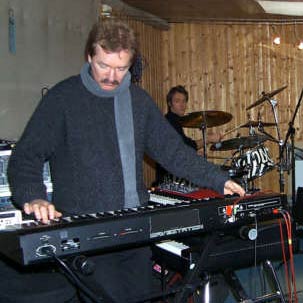
Keyboards & Hardware:
Michael: What keyboards
make your heart tick - Grand piano, Hammond, fender rhodes, mini moog,
Yamaha dx7, Roland d-50 , Korg M1, etc.?
Ingo: I have and had them all - Dx-7
I can't hear anymore. Korg wavestation I still like very much.
Michael: Are
different keyboards different animals, or are they just sound variations
?
Ingo: The main difference between a
guitar and a piano / organ is, that I can't affect the toneheight with
a keyboard, in opposite to a guitar. With a guitar I can make tremoloes
and pull tones up to one tierce higher.
Then the mini moog appeared, and from now on also the keyboarders had the
possibility to modulate and bend, which turned out to sound somehow like
guitar or flute. I also partly played very "guitaristic" then.
But still the difference remained that the moog is monophonic, and the
dream was to be able to play such a synth polyphonic. Well, and then the
prophet 5 appeared and from that time on even that was possible.
Besides you do have to make a difference between a B3, a rhodes and a synth.
The first is an organ. Tones lasts as long as you push the key. On the
piano the tones die away quite fast, so you have to push new ones more
often, and the synth can perform both, so he is a combination of both varieties.
Of course all the keys behave very differently:
Organ = quite light. Piano with weighted keys = rather hard, and the synth
very light, whereas this is actually the most difficult, the hands are
tending to cramp because of the lack of resistance. (there's no weight
to push against).
All in all: You have to adjust yourself to each instrument, but
I would NOT say that I play basically different therefore - which perhaps
might (I don't know) happen to a guitarist.
But if you mean that a keyboard, this artificial, rigid instrument should
appear NATURALLY, then it's not quite easy. By
playing naturally I don't necessarily mean the sounds, but the manner,
the way you play the keyboards.
Michael: Do you have
favorite keyboardsounds (or sounds from other instruments)?
Ingo: Steinway, indian violin and
flute, a full stringorchestra.
Michael: What
do you use now in Keyboards, amps, effects... and
what would you like to have?
Ingo: Roland mk 80 (rhodes),
Nord lead 2 rack, played via Dx-7 keyboard, Wave station, Akai 3000xl,
Ultra proteus, Kawai 5000r, Target mixer, Lexicon reflex, Ibanez echo
device ("step on mine"?), Peavey 800w amp
and 2 jbl monitors of the cabaret series 400 watts each.
recording: Power book G3,400 hrz., Hammerfall dsp soundcard, Multiface,
Unitor 8, Behringer ultragain pro, channel strip, Tannoy reveal monitors,
Mam pa 100 studio amp .
Michael: Does the new
technical possibilities (samplers, sequensers, etc.) inspire you? How ?
Ingo: I work a lot with it, as described
before. anyhow there are enormous potentials in it.
Michael: Can it 'sterilize'
the music in the process for you, so that the music becomes automatic /
non living ?
Ingo: There is that danger, but I mostly record live and only "quantizise"(?)
when it's absolutely necessary. Therefore rhythmically it's not super-perfect,
but it's alive.
Michael: The production
of an album often influences the sound a lot. ECM is wellknown for a particular
sound. What kind of sound are you going for ?
Ingo: That's hard to answer, I like warm,
strange, fragile, distorted, clear, spacy sounds, actually nearly everything
but shrill. It simply has to sound GOOD.
Michael: Dense / dynamic / open / lots of ambience etc. ?
Ingo: Can be all of it, that depends on the tune, but transparency
is important.
Michael: Are you sponsored by any
company ?
Ingo: No
Michael: For any particular
reason ?
Ingo: I'm not a business orientated character,
so something like sponsoring doesn't happen to me. Consider that they also
must feel I could be useful for them (and the big companies probably have
no need of sponsoring me).
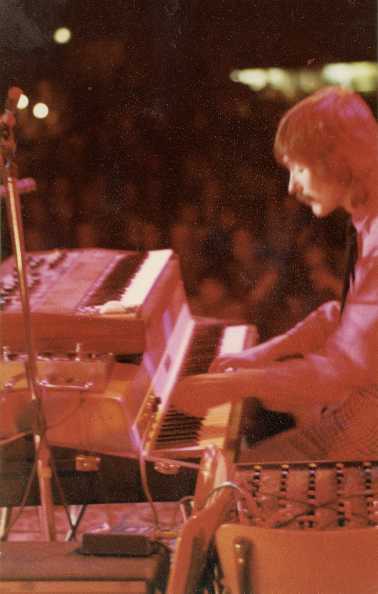
Miscelanneous
Michael: What is
a musicians life ?
Ingo: A good one, even a wonderful one
if you can make a fair living from it.
Michael: What is the
real purpose of his job ?
Ingo: To feel and generate magic,
and to make the listeners feel it too.
Michael: How is
the music business ?
Ingo: Dirty, immoral, criminal, unfortunately.
But there are also some honest people.
Selling is getting more and more difficult and no one really knows how
it will turn out to be.
Michael: How would
you like it to be ?
Ingo: Difficult question, money
shouldn't be that much important.
Michael: Do you
like touring ?
Ingo: Oh yes, but it shouldn't
last too long.
Michael: How is
Germany today compared to the heydays of Kraan 75-79 - Politically /musically
?
Ingo: Many things which were unthinkable
at that time, have become normal in todays society. All in all the society
has become more liberal and less nervous and frightened.
Musically there are more and more music-designers, who are not actually
playing musicians, but who can make wonderful things with nowadays
technical equipment (sometimes terrible things too).
In both groups you can find these and those. But there are still very exciting
things going on.
Michael: Are there
any bands musicians you would recommend us to notice / listen to
?
Ingo: Kruder und Dorfmeister are interesting,
Freundeskreis is also quite good, besides there are many other things
you hear, also in the technoscene, but unfortunately I can hardly
remember the names. Music to movies and commercials are sometimes
also very well done.
Michael: Where
is popular music going in Germany ?
Ingo: I think all kinds of styles
will survive if they are strong, good and authentic. Something new will
only be developed by mixing different styles and different ways of production.
Michael: Is it's position
in society, and it's power different from that time ?
Ingo: In those days music was
more related to social changes, today it's more protection and increase
of personal freedom and individuality. Commerce has got a far too big influence,
unfortunately I think.
Michael: Do you read
litterature / poetry ? If yes, what kind ?
Ingo: I read novels but also psychological themes
for example Edmund White, Amistad Maupin, Mark Matousek, Klaus Mann, Andrew
Holleran, Jossi Avni, Hesse, Dan Millman, Chuck Spezzano, etc.
Michael: What are the
ingredients in a good rocksong ?
Ingo: A good melody upon a thrilling
rhythm and an even more thrilling refrain, (hookline).
Michael: How does good poetry differ
from a good rock song ?
Ingo: It's considerably more quiet ! and maybe
not that abstract, but both can cause the same. It's inspiring and extoling,
it's culture.
Michael: What do
you like to do when you're not making music? Are there any
other passions beside music ?
Ingo: Architecture is very interesting
to me and I'm also interested in cars since I was a child. Arts
can also touch me very much and affect me in a creative way.
Michael: What are you most thankful
about ?
Ingo: That I was given a musical talent (what
else should I have done with my life?), and that I'm healthy and alive.
Thanks !
Michael: Thanx for the interview and the great music !
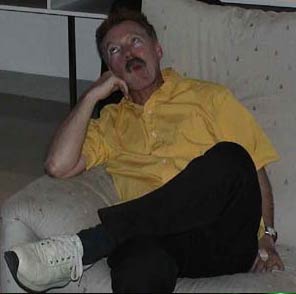
O.K. - No more boring questions : -)
German/English translational help mainly by Chrille but also by
Skiold.
|
|